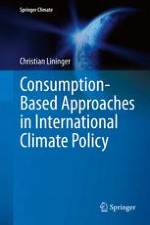2015 | OriginalPaper | Chapter
10. Design Options for Consumption-Based Policy Approaches: A Literature Review
Author : Christian Lininger
Published in: Consumption-Based Approaches in International Climate Policy
Publisher: Springer International Publishing
Activate our intelligent search to find suitable subject content or patents.
Select sections of text to find matching patents with Artificial Intelligence. powered by
Select sections of text to find additional relevant content using AI-assisted search. powered by
